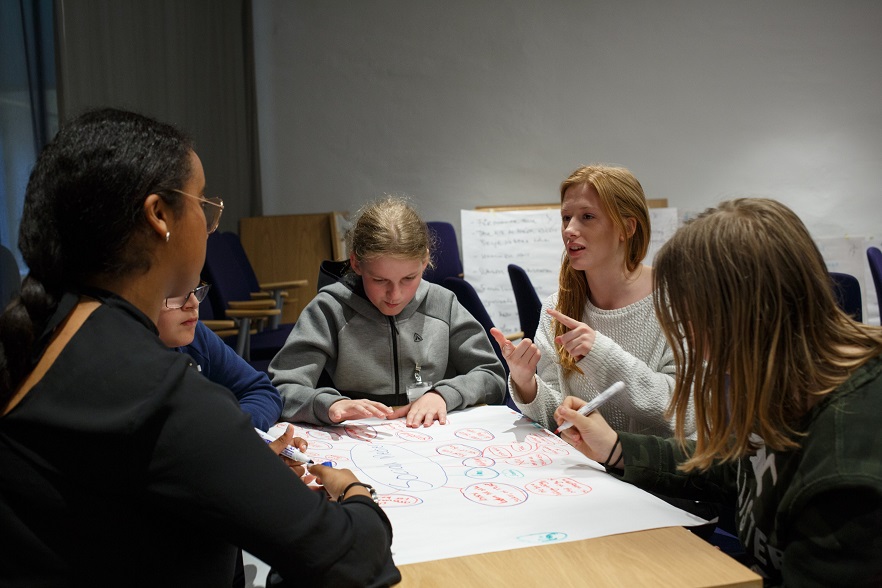Teaching debate will be one of the most interesting, challenging and rewarding experiences you will have as a Science educator. As a modern Odysseus, you will extend your personal boundaries of knowledge in your scientific cognitive field and you will develop essential life skills. You will share the same experience with your students either you are a teacher of Junior High School (students of 12-15 years old) or of a Senior High School (students of 15-18 years old).
Undoubtedly, this experience will, also, be demanding. It takes a great amount of inquiry, planning, guidance of students along the way, and the ability to be as critical as possible while offering constructive and affirming feedback to them as a mentor.
“What do we need to get started?” is “Less than you think.” You need a basic understanding of how a debate works, a willingness to try out different speaking and listening exercises, exciting motions that bring people in to participate in debates, and an open and welcoming environment (Smith, 2011:17).
Early in the apprenticeship, there is a great deal of conceptual knowledge that, you, and your students must gain, since the implementation of debate in classroom or within a contest signals the final station of a prior journey in the land of argumentation. First, basic notions of argumentation theory must be examined and understood before their conscious use by the students in Science’s context. Students have to learn how to structure an argument for expressing their scientific positions on a topic and how to provide reliable evidence for supporting their proposals. Also, the deep knowledge of argumentative notions will also facilitate the recognition of fallacies and, consequently, the enhancement of students’ critical thinking. In this way, the content of the students’ speeches will be ensured.
Later in the apprenticeship, it will be clearly understood that the content of an argument is not always sufficient for convincing the audience about the soundness of its scientific truth. In this moment, you will realize the importance of sharing with your students communication techniques that will enhance their arguments’ presentation of their arguments. For example, the tone and volume of the voice, the speech tempo, hand gestures, eye contact, the body position as well as the use of notes, will arise as important factors that influence the delivery of the selected arguments.
For achieving all the above goals, communication and collaboration between you and your students must be developed. Argumentative linguistic games and oral or written activities will facilitate the practice and the experiential character of learning. During this period, it is important that, you engage, as instructor, with the students to ensure they are on-task and on-track, because of the limited time you have at your disposal for preparing a debate. The educational packages on STEM issues will facilitate your task, since they will provide you with the necessary material and reliable sources for constructing your arguments during your classroom debates.
In more, keep in mind that besides the classroom debates that you will conduct with your students, in the end of the school year, your team will be asked to participate to competitive debates with students from other schools that participate to the project ODYSSEY. For this reason, it is important to learn the basic set of methodological rules and principles that direct the organization of a schools debating competition. In this way, your students will be ready to better unwrap the argumentative skills in STEM that you have developed during the whole school year! Also, all the students have to get familiarized with digital applications that will facilitate their active involvement during the debate through the asking of questions to the debaters as well as through their initial and final votes.
During the training of your students you can enhance your collaboration with other colleagues from your field or from different fields. For example, a teacher of Language Arts who is expert in debating, might support you in your first steps in debating STEM topics with your students enhancing at the same time their linguistic skills! In more, you will have the opportunity to get acquaintance with scientists and researchers!!!
But the most important is that you have to teach your students ETHOS. Getting involved in a debate means that you consciously want to become a better person (Quintilian used to say “vir bonus”), both as individual and as citizen. Debate is interwoven with the notions of respect, tolerance, acceptance of the different opinion, freedom of speech. That’s why we suggest you to start your lessons by learning, first, and teaching, then, to your students the code of a debater (Snider, 2008) as it is presented in the next chapter of this guide.
In more, the notion of the audience is crucial during the implementation of a debate. As teacher, you have to provide the students that compose the audience with the necessary objective standards for evaluating the best debating. In other words, you have to teach and develop critical thinking skills to the future citizens of the world!
It sounds like a quite interesting adventure. Enjoy it!!!

